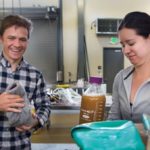 In a new study published in Nature Communications, a team of researchers led by Jay Keasling, CEO of the Department of Energy’s Joint BioEnergy Institute (JBEI), report that brewer’s yeast can be engineered to alter the flavor of beer. In this case, the scientists incorporated recombinant DNA derived from yeast, mint, and basil so the brewer’s yeast would biosynthesize aromatic monoterpene molecules that impart hoppy flavor. The benefits of this are two-fold: bioengineering can lead to flavor palette expansion while increasing the sustainability of the brewing process.
In a new study published in Nature Communications, a team of researchers led by Jay Keasling, CEO of the Department of Energy’s Joint BioEnergy Institute (JBEI), report that brewer’s yeast can be engineered to alter the flavor of beer. In this case, the scientists incorporated recombinant DNA derived from yeast, mint, and basil so the brewer’s yeast would biosynthesize aromatic monoterpene molecules that impart hoppy flavor. The benefits of this are two-fold: bioengineering can lead to flavor palette expansion while increasing the sustainability of the brewing process.
First authors and UC Berkeley colleagues Charles Denby, former postdoctoral fellow, and Rachel Li, doctoral candidate, have launched a startup called Berkeley Brewing Science with the intention to market hoppy yeasts to brewers. They plan to offer strains that contain more of the natural hop flavor components, while creating other strains that incorporate novel plant flavors not typical of beer brewed from the canonical ingredients: water, barley, hops, and yeast. In addition to crafting hops-free unique flavors, this new technology will also make the brewing process more sustainable. Growing hops uses a lot of water, fertilizer, and energy to transport the crop, all of which can be avoided by using yeast to make a hop-forward brew.
The ingenuity of this project led by Keasling foreshadows JBEI’s expanded emphasis on finding novel methods for bioproduct development from biomass. Other JBEI scientists who contributed their expertise to this research included Zak Costello (development of predictive mathematical models), Weiyin Lin (cloning and strain construction) and Leanne Jade Chan and Christopher Petzold, (targeted proteomics). Henrik Scheller and Hector Garcia Martin supervised the work. Read more at UC Berkeley News
(photo credit: Sarah Craig/KQED)



